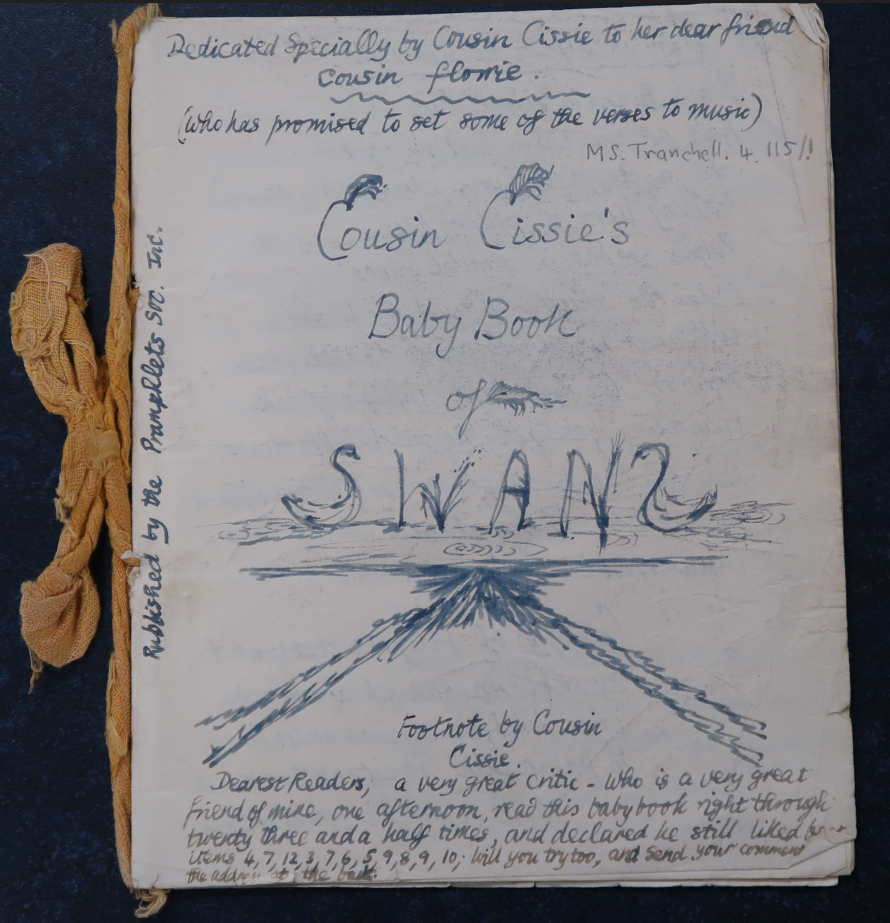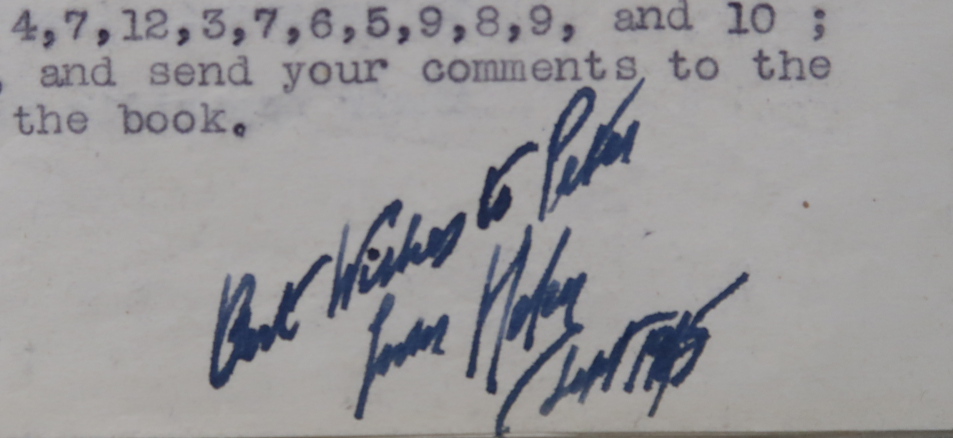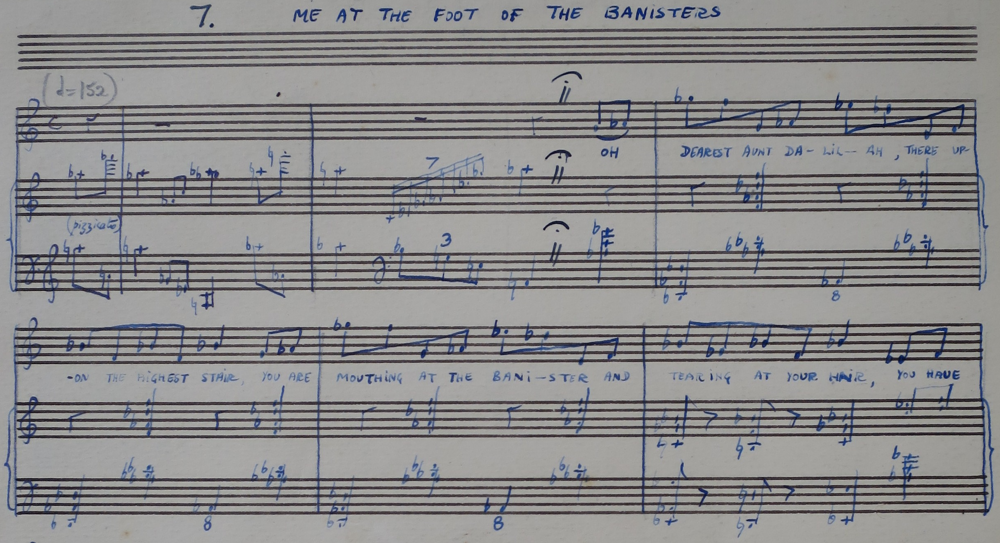Cousin Cissie's Baby Book of Swans
- Posted in:
- song
- 1940s
- free score
'Cousin Cissie's Baby Book of Swans' is a cycle of thirteen songs composed between 1944 and 1946. The Cambridge University Library states 'words by Helen Dray', but it is almost certain the words are by Tranchell himself.
The earliest known form of the work is a hand-written booklet containing the poems and some additional notes at front and back, sent to Jane Scott on 27 October 1944, from Lieut P A Tranchell, Malta Command Signals, Malta Force, with the words 'Pray accept this small war-offering from an exiled fiend. It was in the rainy season on mount Ararat that I first conceived the idea...'. The charade seems to have been that the poems were written by the fictional 'dear frail precious' Cousin Cecilia ('Cissie'), and most of the poems were oddly written in capitals but with dots on the Is.

The poems seem to be nonsense verse, in the tradition of Lear and Carroll, closely relating to various themes in the letters between Tranchell and Jane Scott, in which he sometimes adopted the character of Mephistopheles, even scorching the paper of his letters as a sign of excitement (Jane began many letters "Dear Mephi").
A typeset edition of the poems (with original footnotes) can be found here: tranchell_ccbbs_lyrics_v2.0.pdf
The musical edition, inked over pencil drafts in a manuscript book from E. Lucia & Sons, 276 Kingsway, Valletta (Malta), dispenses with the various footnotes, however the title page now states "by Helen Dray", and "Sequel to AUNT NINA'S BIG BOOK OF DUCKS.) (ALL UNBROKEN, DEARS!)". What can we make of this? "Helen Dray" makes her first appearance in relation to this work on the cover of a typeset version, presumed to pre-date September 1945, which is also signed in ink 'Best wishes to Peter from Helen Sept 1945':

The name does not appear on the earlier hand-written edition, which was entirely in Tranchell's hand, and was not mentioned in correspondence with Jane Scott. We suspect the character is invented, and the signature added by PAT himself, or a friend, to maintain the conceit.
We find Helen Dray in another Tranchell work: the first pencil sketch for 'Seven Pieces almost in alphabetical order' for piano (probably also started whilst Peter was in Malta) contained (stuck on to the inside front cover) a sheet containing “Some Nice Thoughts on Peter’s Pieces” written by Mrs Helen Dray in a 'precious style and florid hand' (Marchbank). Helen Dray's words on that work read unmistakably like Tranchell himself.
On the title page of the musical setting of Cousin Cissie's Baby Book of Swans is a list of the supposed musical sources for each song – or as Peter puts it “Music adapted with apologies from….”. While each seems well-suited to the character of the song it is paired with, they would all seem to be spurious, again part of the nonsense:
- 'Penes te, rex regium' (Sportex Lativian Paeanography)
- 'Nocturne' from Mrs Vere-Baste’s “Brumana”
- 'Troxy Polka' from Jean Cazuillet’s “Amour propre”
- 'Bunnies' Children’s Piece by Hermann
- Valse Theme Song from Raubhor’s “The Love Pirate”
- 'Novelette 1927' for Wurlitzer by Kim MacColley
- The Ballet 'Les Autruches' by Gustav Tussaud
- 'Woodman’s Daughter' - Ballad by Kalinsky
- 'Marche des Esclaves Egyptiens' from Mercer’s “Osiris”
- 'The Bellboy’s Boogie' by Alfie Stern and Mac Thornmill
- Recit. & Arietta 'O Fuoco' from Renoli’s “Caligula”
- Father Silvester’s 'Quicunque vult' (The Chorangelus Collection)
- 'Overture Macabre' by Jeanmichel Periquon.
In his analysis of Tranchell's early works, Peter Marchbank wrote:
An intriguing work from the War years is a set of thirteen songs (or burlesques, as Peter later described them) written in a manuscript book that was obtained in Valletta whilst Peter was on active service there in 1944-45. ... Most of the songs have the feel of cabaret or the drawing-room about them. The first, All by an elf in the moonlight, has a demandingly high tessitura for either soprano or tenor. The fourth song, Pyjama Ridge, is interesting rhythmically since, from time to time, 7/8 bars are thrown in. Aunt Detaining, the fifth song, is a delightful example of a waltz-song. Noel Coward might have been pleased with the seventh song, Me at the foot of the banisters. Above all, though, the songs are bound together by Peter’s piano writing which is already idiomatic even though it lacks the fluency of his more mature works.

Scores
Typesetting the songs is in progress. Individual songs will be presented here first, initially in draft and then improved, then combined as a single edition.
1. All by an elf in the moonlight
3. Entertaining
4. Pyjama ridge
6. Tea at the foot of the garden
7. Me at the foot of the banisters
9. Vox humana
10. Aunt arraigning
12. 'D' at the foot of a letter
13. Turn back the flock
Please also see our guidance on the use of scores.